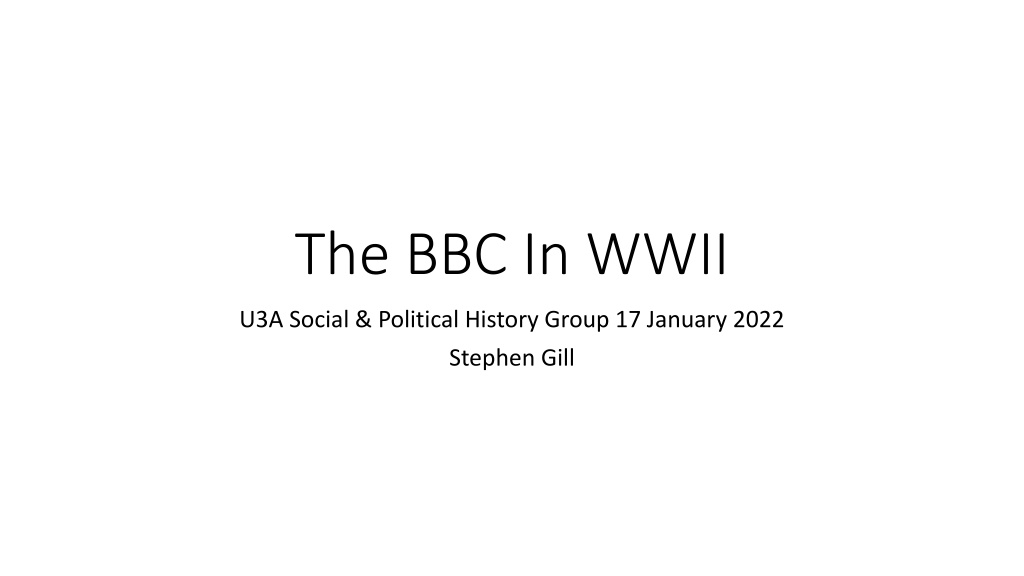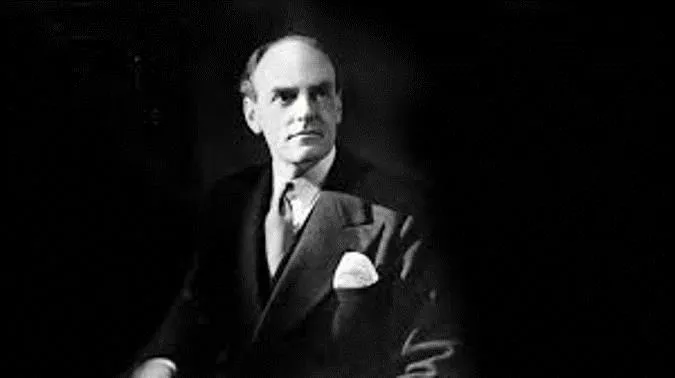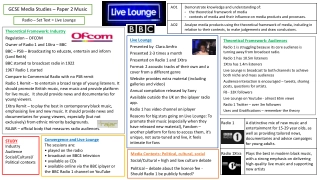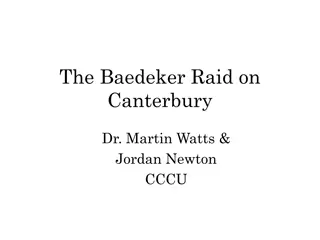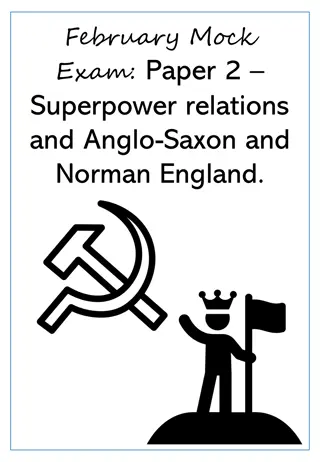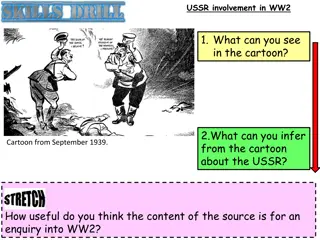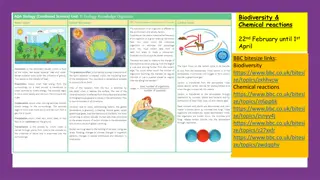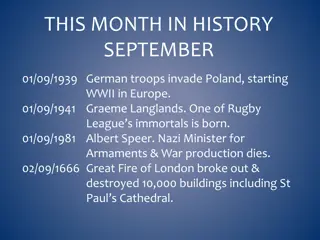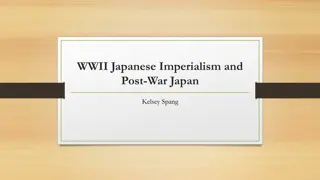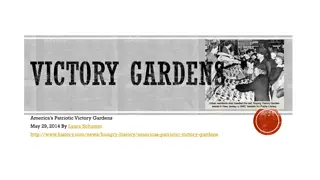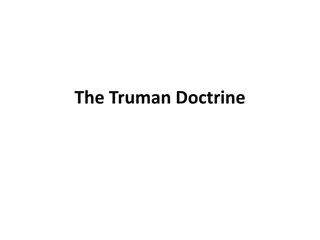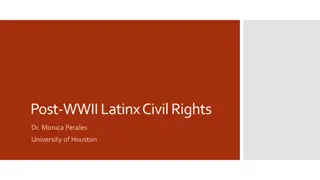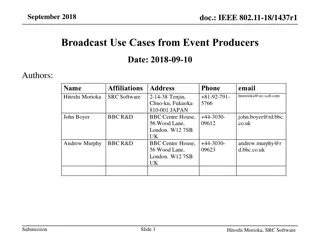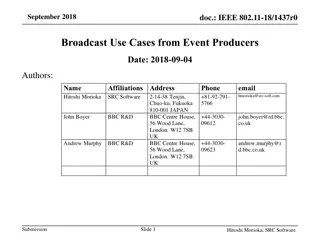The BBC in WWII: A Historical Overview
The BBC played a significant role during WWII, adapting to wartime conditions and providing essential news and entertainment to the public. From its pre-war development to its transformation during the outbreak of war, the BBC served as a vital communication tool and source of information for the British population.
Download Presentation

Please find below an Image/Link to download the presentation.
The content on the website is provided AS IS for your information and personal use only. It may not be sold, licensed, or shared on other websites without obtaining consent from the author.If you encounter any issues during the download, it is possible that the publisher has removed the file from their server.
You are allowed to download the files provided on this website for personal or commercial use, subject to the condition that they are used lawfully. All files are the property of their respective owners.
The content on the website is provided AS IS for your information and personal use only. It may not be sold, licensed, or shared on other websites without obtaining consent from the author.
E N D
Presentation Transcript
The BBC In WWII U3A Social & Political History Group 17 January 2022 Stephen Gill
Pre-War BBC 1922 British Broadcasting Company created 1927 Royal Charter British Broadcasting Corporation Lord Reith Director General from 1927 and in charge 1922-38
Pre-War BBC (2) By 1939, 9 million licence holders (73% of households) and estimated max. audience of 40 million One national service plus regional services Programmes included news, music, variety, drama and speech Development of Outside Broadcasts from A Cellist with Nightingale in Garden 1924 Competition from Radio Luxembourg and Radio Normandie Television by 1939, London area only and about 20,000 sets
Pre-War BBC (2) - News No BBC journalists all news was taken from press agencies and edited for broadcast. News dept formed in 1934 No news bulletins before 6 p.m. to protect Newspaper interests From early 30s use of Correspondents specialists who provide commentary/opinion pieces after news bulletins Munich 1938 broadcasting of Chamberlain s speeches in French, German & Italian led to BBC European Services
Pre-War BBC (3) - News Richard Dimbleby appointed 1936 & proposed mobile units able to report live on events via first mobile recording unit. First such broadcast from Fen floods 1936
Outbreak of War TV station was closed immediately for the duration BBC closed all regional services & provided a single service of regular news bulletins and announcements. Note: fear of using radio transmitters as navigational aids to enemy aircraft
Outbreak of War (2) All drama, speech & entertainment ceased save some music Sandy MacPherson on the organ - & daily service & Children s hour
Outbreak of War (3) BBC as Auntie dispensing nannying government advice Dispersal of services and departments Wood Norton nr Evesham Bristol including underground studios at Clifton Rocks Tunnel Under pressure from public, light entertainment was restored from late Sept; drama & serious music from Oct 1939 Jan 1940 creation of Forces Programme for BEF in France eventually became the Light Programme after the War.
Relationship with Government Pre-war plan was to place BBC under Ministry of Information & take off air because of use of transmitters as navigational aids Ullswater Report 1936 envisaged full government control Appointment of Frederick Ogilvie as DG 1938 Ministers of Information 1939 Lord MacMillan vague instructions to BBC re content: Removed 5/7 Directors but lost nerve re taking over the Corporation Replaced by Lord Reith 1940 Duff Cooper May 1940 Resistance by Governors to attempts to exert control
Alfred Duff Cooper, Ist Viscount Norwich Minister of Information 1940 - 41
Relationship with Government (2) Criticism of the BBC as lacking patriotism and wisdom . (K Wood Chancellor) JB Priestley and impact of Postscript series of talks June Oct 1940, then further series to March 1941 Postscripts - JB Priestley - BBC Archive
Relationship with Government (3) Churchill s speeches myths and reality Dunkirk and Finest Hour Churchill s hostile attitude to BBC dating back to 1926 1940-41 struggle to gain greater control of BBC Appointment of MOI general advisors MOI struggle to gain primacy in govt over news management resisted by Armed Services MOI attempts to wrest editorial control from BBC resisted by Governors Duff Cooper resigned July 1941 replaced by Brendan Bracken an ally not a threat
Brendan Bracken, Minister of Information 1941 - 45
Relationship with Government (4) Bracken instituted GM Young s review of standards of English at BBC. Robert Foote appointed to review out of control finances at BBC - led to resignation of Ogilvie as DG & replacement by Sir Cecil Graves Nicholls Directive (1942) Reithian attempt to clean up dance music and eliminate crooning (Vera Lynn) resisted by staff 1943 Graves resigned replaced by Foote. He appointed William Haley as Editor-in-Chief. In turn Haley replaced Foote as DG in 1944
News and Reporting News bulletins became central to public understanding of the war presenters became known by name for the first time e.g. Alvar Liddell
News and Reporting (2) September 1939 Dimbleby with radio car went to France to report Phoney War BBC attitudes to news changed as a result of Lord Haw-Haw s broadcasts BBC role now became clear - to debunk fake news RT Clark Home News Editor: the only way to strengthen the morale of the people .. is to tell the truth even if the truth is terrible. Churchill as PM hated BBC and wanted to exert greater govt control but it only gained his intermittent attention Self- censorship by BBC reporters and editors Dunkirk news blackout
News and Reporting (3) 14 July 1940 first as live reporting of air strikes on a channel convoy Bombs 15 Oct 1940 Broadcasting House 7 killed but the news bulletin continued 8 Dec 1940 one side of BH destroyed 1 death 10 May 1941 Maida Vale Studios After Fall of France, Dimbleby spent next 2 years in Middle East/N Africa Battle of Britain saw massive increase in mobile recording units By 1943 5000 discs recorded per week By D Day 7000 discs recorded per week Blitz: role of US reporters (Ed Murrow). Reports not censored to same standards 6 Jan 1943 Dimbleby first reported from a bomber mission to Germany. A hazardous undertaking (20 missions undertaken in total) Rod Whiting - Richard Dimbleby reports from a bomber raid over Germany - BBC Sounds Also 1943, BBC journalists covered Operation Spartan a war exercise in Oxfordshire. Led to the attachment of BBC journalists to the Army in advance of D Day.
News and Reporting (4) Development of Midget a 40lb portable recording machine 12 double sided discs, 1 hour recording D Day saw 17 BBC correspondents go ashore with troops (cf 1 per newspaper)- incl Howard Marshall (landings), Chester Wilmott (gliders), Guy Byam (Paratroopers) After 9 p.m. on 6thJune news bulletin was followed the first War Report - broadcast daily until May 1945. Attracted 10 15m listeners. Broadcast in USA on 725 of 914 Radio stations Use of phone despatches to supplement Midget recordings 18 June BBC set up mobile transmitter at Arromanches to speed up transmission of reports to London Sept 1944 2 BBC journalists embedded with troops at Arnhem Guy Byam & Stanley Maxted
News and Reporting (5): Still wearing their dirty clothing, BBC War Correspondents Stanley Maxted (left) and Guy Byam tell their stories of Arnhem at Broadcasting House on the 27th September 1944.
News and Reporting (6) Dimbleby s report of entry to Belsen April 1945, broadcast 19 April Richard Dimbleby describes Belsen - BBC Archive Richard Dimbleby was the first broadcaster to enter the camp and, overcome, broke down several times while making his report. The BBC initially refused to play the report, as they could not believe the scenes he had described, and it was only broadcast after Dimbleby threatened to resign. 2 correspondents died whilst on attachment Kent Stevenson & Guy Byam
Censorship Early in the war debate re news vs propaganda linked to concerns re morale Structure of censorship self censorship by BBC Approval of broadcast scripts by MoI MoI/Services could issue D (Defence) Notices - stops But each Service had censorship powers e.g during the Phoney War : e.g. Dimbleby reporting from Maginot Line forbidden by Army to state he was in France! Charles Gardner strike because of RAF censorship Scapa Flow incident
Censorship (2) Results of censorship on other services: Arthur Askey and rain in Manchester The banning of Church bells and impact on records played After D Day military attitudes remained wary e.g. Montgomery shutting down BBC reports because, in error, his speech to troops in Normandy had been broadcast
Entertainment Forces Service met demand for lighter programming music, variety, comedy, sport & record requests. By 1941 had 60% of listeners Some key programmes Drama from BBC Repertory Theatre; Saturday Night Theatee Kitchen Front (Freddie Grisewood) In Your Garden & Radio Allotment (C H Middleton)
Entertainment (2) Brains Trust Julian Huxley, Cyril Joad & Cdr A B Campbell Radio Doctor Charles Hill Hi Gang Ben Lyon & Bebe Daniels plus Vic Oliver
Entertainment (3) Workers Playtime broadcast from factory canteens Music While You Work Remained subject to censorship & criticism Noel Coward s song Don t Let s be Beastly To The Germans Criticism of Americanisation of the Airwaves Documentaries Home Front sketches of life in Britain Shadow of the Swastika about the rise of Nazism Drama Saturday Night Theatre and Appointment With Fear 2 most popular drama shows Schools Programmes by 1944 31 weekly series, plus news commentary & twice weekly religious service
Entertainment (4) Proms reinstated 1942 and moved to the Royal Albert Hall After end of War Forces Network retitled as Light Programme With so many service personnel abroad, Family Favourites started Third Programme started 1946
Overseas Service 1939 broadcasts in 7 languages 45 by 1945 1941 saw the nascent service move to Bush House & expand forerunner of World Service De Gaulle s address to the French people June 18th1940 BBC News bulletins in French seen in France as fuller, more varied and interesting than French news before fall of France after the Armistice, became seen as more trustworthy than fake news of Vichy Underlying conflict with govt re control of foreign service e.g. veto of De Gaulle s address to French troops in North Africa 1942 After June 1940 development of a messaging service between French personnel in Britain and family in France
Overseas Service (2) By 1941 full day long programme mixing news, talks & magazine type programmes Ici France V for Victory 1941. Adopted throughout Europe and by Churchill Douglas Ritchie linked to first notes of Beethoven s 5thSymphony Use of broadcasts to aid/send messages to Resistance Georges Begu 1942 De Gaulle s call for Bastille day celebrations and singing of La Marseillaise Messages led to conflict with SOE re control of propaganda and black arts in Europe By Feb 1944 71 messages sent in one 15 minute programme totalling 8.5 minutes
Overseas Service (3) German Service used English speakers of German because of wariness of the allegiances of German nationals in Britain Developed by Sefton Delmar as means of taking the war to Germans via the airwaves cover, dirt, cover, cover, dirt, cover, dirt Hindustani Service created May 1940 - among staff as Talks Assistant then Producer George Orwell (background gained for his novel 1984 and references to Ministry of Information)
Broader Changes as a Result of the War Reinvention of BBC reputation in Britain and abroad BBC News seen as authoritative and now content self-generated Expansion of BBC in size, number of staff and reach 1939 4000 personnel 1945 11600 personnel (5800 women) Employment of women & opportunities Audrey Russell possibly 1st woman correspondent broadcast Northern voices first heard on radio as authority figures e.g. Wilfred Pickles, first Northern newsreader 1941 BBC Monitoring Service expanded to 500 personnel by 1941 Technical and technological changes e.g. mobile broadcasting Embedded journalists in military
